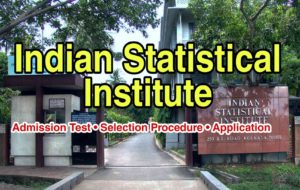Best Research Institute in west bengal for PhD in Physics : In West Bengal, are you seeking a PhD in physics? In that case, you’re in luck! Some of the top research institutes in the nation, providing good prospects for physics PhDs, are located in West Bengal. You are sure to find a field that aligns with your interests and goals, regardless of your background in astrophysics, cosmology, quantum information, biology, condensed matter physics, or materials science. I’ll outline some of the best research institutes in West Bengal for physics PhD candidates in this blog article, along with a quick synopsis of their facilities and research focus. :
One of the seven IISERs created by the Indian Ministry of teaching to advance excellent fundamental science teaching and research is the Indian Institute of Science Education & Research Kolkata (IISER-K). It was established in 2006 and has been included by several rankings as one among India’s best academic institutes. In the fields of physics, chemistry, biology, mathematics, statistics, earth sciences, computational and data sciences, humanities, and social sciences, the institute provides Ph.D. programmes. A national level entrance exam (JEST/GATE/NET) or an internal entrance exam followed by an interview determines admission. The institute features multiple interdisciplinary centres and initiatives in addition to first-rate research facilities and infrastructure.
Indian Institute of Technology Kharagpur (IITKGP):
Founded as the nation’s first IIT in 1951, this is among the oldest and most prestigious engineering schools in India. The institute offers undergraduate, graduate, and doctorate programmes in engineering, science, business, law, medical science, and the humanities through its 19 academic departments. Via its Department of Physics, which conducts research in a number of fields including high energy physics, cosmology, quantum field theory, quantum optics, nonlinear dynamics, soft matter physics, etc., the institute provides PhD programmes in physics.
National Institute of Technology Durgapur (NITD):
Founded in 1960 as one of India’s eight Regional Engineering Colleges, this is a public engineering institution. The institute offers undergraduate, graduate, and doctorate programmes in engineering, science, management, and the humanities through its 17 academic departments.Through its Department of Physics, which conducts research in a number of fields including superconductivity, nanomaterials, biophysics, and magnetism, the institute provides PhD programmes in physics.
Indian Institute of Engineering Science and Technology Shibpur (IIEST):
Bengal Engineering College was the previous name of this esteemed public engineering institution. In 2014, the Indian government designated the institute as an Institute of National Importance. The institute offers undergraduate, graduate, and doctorate programmes in engineering, science, architecture, management, and the humanities through its sixteen academic departments. Through its Department of Physics, which conducts research in a number of fields including materials science, nanotechnology, condensed matter physics, optics and photonics, etc., the institute provides PhD programmes in physics.
S. N. Bose National Centre for Basic Sciences (SNBNCBS):
This independent research organisation does basic science research. The institute was established in 1986 as a Registered Society under the auspices of the Department of Science and Technology, Government of India. The Centre was founded in memory of Professor S. N. Bose, a titan of theoretical physics who contributed some of the most important conceptual advances to the fields of quantum statistics and mechanics. The Centre has grown to become a significant hub for fundamental science research and development. PhD programmes in condensed matter and materials physics, physics of complex systems, astrophysics and high energy physics, and chemical and biological sciences are all available at SNBNCBS.
Indian Centre for Space Physics (ICSP):
This esteemed research institution is committed to conducting investigations in a range of demanding fields within the fields of astronomy, astrophysics, and space science. Despite being a government-aided institution, much of the funding for research is provided by grants from national and international funding organisations. At Cooch Behar, ICSP operates a cutting-edge observatory with a number of instruments for studying the Sun, Moon, and other celestial bodies. Additionally, ICSP is home to a high-performance computer centre that makes it possible to simulate intricate physical processes numerically. PhD programmes in planetary science, solar physics, astrophysics, and space weather are available at ICSP.
Bose Institute:
The renowned scientist Sir Jagadish Chandra Bose established this institute in 1917, making it one of the most esteemed and ancient in all of India. Particularly in the areas of molecular biology, bioinformatics, cosmology, astrophysics, and biophysics, the institute has a long history of scientific advancements. The institute provides Ph.D. programmes in transdisciplinary sciences, biological sciences, chemical sciences, and physical sciences. Both an interview and a written exam determine admittance. The institute offers a vibrant atmosphere for research and collaborates with numerous national and international organisations.
Indian Association for the Cultivation of Science (IACS):
Another organisation with a distinguished history is the Indian Association for the Cultivation of Science (IACS), which was founded in 1876 by Dr. Mahendra Lal Sircar. It is the oldest scientific establishment in Asia and the cradle of Indian modern science. Numerous distinguished scientists have come from the institute, notably Sir C.V. Raman, who made the discovery of the Raman effect here. The institute provides Ph.D. programmes in condensed matter physics, theoretical physics, atomic, molecular, and optical physics, spectroscopy, solar cell physics, and nanoscience, among other fields of physics. An interview and the national level entrance exam (JEST) determine admission. The institute has a number of ongoing projects financed by several agencies, as well as cutting-edge infrastructure and equipment for study.
Indian Statistical Institute (ISI) :
One of the top institutes for research and instruction in computer technology, statistics, mathematics, and allied fields is the Indian Statistical Institute (ISI). The Government of India has designated it as an Institute of National Importance. Professor P.C. Mahalanobis created it in 1931. Physics, mathematics, statistics, computer science, quality engineering and management, cryptology and security, library and information science, languages, and sociology are among the fields in which the institute provides Ph.D. programmes. Both an interview and a written exam determine admittance. The institute holds numerous conferences, seminars, and workshops all year long in addition to having a thriving academic culture.





semaglutide price – buy generic semaglutide 14mg cyproheptadine 4mg oral
Your comment is awaiting moderation.